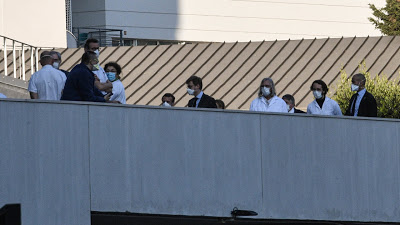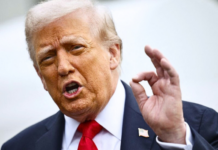AFP
President Emmanuel Macron on Thursday held a surprise meeting with the Marseille-based French medical professor who has caused controversy within the country’s scientific community for insisting the anti-malaria drug chloroquine can beat the coronavirus.
Professor Didier Raoult met Macron at his specialised infectious diseases hospital in Marseille, in a visit that was not announced in advance, the French presidency said.
The meeting lasted three and a half hours and, unusually, media were allowed no access.
The findings of Raoult, a prominent figure in France with shoulder-length blond hair and a grey beard, have divided opinion, with some hailing him as a saviour but others deriding his work as fake.
The Elysee has said that Macron intends to consult a broad spectrum of voices before giving his third address to the nation on the coronavirus epidemic on Monday.
A French presidential official insisted that the meeting did not represent any kind of “recognition” of the professor’s methods ahead of his speech on Monday.
“The president wants to take into account all the tests and studies, including those of professor Raoult. It is not for him (Macron) to settle the debate, this must be done by scientists,” added the official.
‘Strong legitimisation’
Macron is expected to announce that a lockdown that began on March 17 will be
further extended beyond April 15, and further measures amid a persistently grim
daily death toll, but also signs of gradual improvement.
Raoult has claimed that a new study he has conducted confirms chloroquine’s “efficiency” at combatting the virus.
He was expected to share the findings at the meeting with Macron who has yet to publicly share his opinion on the controversy.
Frederic Dabi, deputy director general of polling firm Ifop, said Macron was seeking to show he was consulting a broad body of opinion.
It is a “way of controlling the comments of Didier Raoult because now he cannot say no one ever listened to him” while also a “strong legitimisation” of a figure who remains hugely controversial.
Read Also COVID-19: U.S. repatriates 997 American citizens from Nigeria
Raoult, whose theory has been taken up by US President Donald Trump, said his new study of 80 patients showed that four out of five of those treated with the drug had “favourable” outcomes.
He had earlier reported that after treating 24 patients for six days with hydroxychloroquine and the antibiotic azithromycin, the virus disappeared in all but a quarter of them.
The research has not yet been peer reviewed nor formally published in a medical journal.
France on Thursday reported its first fall in the number of patients in intensive care suffering from COVID-19 since the coronavirus epidemic began, with 82 fewer people in intensive care units compared with the day earlier.
The total combined death toll in hospitals and nursing homes now stands at 12,210.















